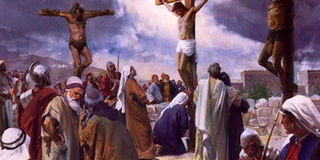Life triumphs over death

Over the centuries, simply by looking upon the crucifix, millions of people have experienced God’s love and compassion and in turn found themselves drawn to God.
What you need to know:
- Each of us in different ways has to accept some significant loss if we are to remain true to our deepest and best self, true to what God is asking of us. Our greatest desire should be to keep up communion with Jesus, and derive grace from him.
“Unless a grain of wheat falls into the earth and dies, it remains alone; but if it dies, it bears much fruit” (John 12:24).
With intention of preparing his disciples for his imminent death as a necessary means to glorification, Jesus uses the analogy of a physical law to deliver a spiritual message. A grain of wheat, though containing in itself the germs of life, would remain alone unless it fell to the earth. Its death then would release the inner life-power and multiply itself in successive harvest of much fruit.
Jesus goes on to describe that harvest in prophetic words: “When I am lifted up from the earth, I will draw all people to myself.” (John 12:32). If God was at work through the life of Jesus, He is even more so through his death. Jesus’ death reveals the power of God’s love, even more fully than through his teaching and healing. Christ’s death on the cross drew people to God, and continues to do so.
Love
Over the centuries, simply by looking upon the crucifix, millions of people have experienced God’s love and compassion and in turn found themselves drawn to God. By accepting the loss of so much that was dear to him, Jesus drew people of all nations to himself and, thereby, to sharing in God’s life.
In the moral world, power finds its source in the death of the Son of man. In His death life bursts forth, and grows up, and multiplies itself in the great spiritual harvest of the world. The great harvest will be reaped only when he shall have sacrificed his life and put away sin by the sacrifice of himself. It is, too, only as every believing man/woman dies to himself/herself, is crucified with Christ, and is dead with him to the world that he/she rises again in the newness of life.
Voluntary
Christ compares himself to a single corn of wheat, because he was alone in the salvation of his people. Christ’s death was voluntary, both on his Father’s part, and on his own. It was real, and not in appearance only. It was but for a short time; as the corn of wheat that dies, soon revives again, and is quickly above ground. So Christ, though he really died, did not long continue under the power of death, but rose again the third day, and now lives forever.
Had not Christ died, none of us would have lived; none of us could have been justified; nor could our sins have been expiated; nor would any of us have been regenerated. Thus Christ might have possessed his heavenly glory alone, without becoming man. Or, after he had taken man’s nature, he might have entered heaven alone, by his own perfect righteousness, without suffering or death; but then no sinner of the human race could have been saved.
Our part
Each of us in different ways has to accept some significant loss if we are to remain true to our deepest and best self, true to what God is asking of us. Our greatest desire should be to keep up communion with Jesus, and derive grace from him. We must be indifferent to the trivial concerns of this life, that we may serve God willingly.
This moves us away from self-centeredness and reach out to others with love and joy. In dying to self, we find genuine life by depending on God, who provides much more than we can imagine. Jesus came into the world to teach us how to die by his example and then to assure us that life triumphs over death.




